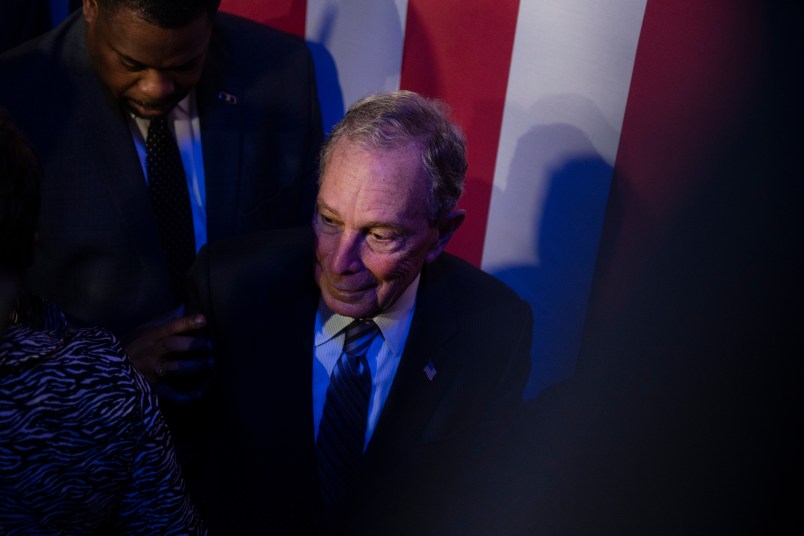Thanks to a Democratic National Committee rule change, the ninth Democratic presidential primary debate Wednesday will see the entrance of a new candidate to the stage: former New York Mayor Michael Bloomberg.
Bloomberg has been lurking in the background of the first few contests with his name absent from the ballot, but being beamed into the households of voters in Super Tuesday states almost constantly. His virtually bottomless pockets have enabled him to blanket the cluster of states in reminders that he has the money — and chutzpah — to take on President Donald Trump.
As his name has climbed in the national polls, other candidates have taken notice and their knives out.
Sen. Elizabeth Warren (D-MA) bemoaned that Bloomberg was able to “buy” his way into the debate, but took solace in the fact that she’d be able to take on the “egomaniac billionaire” over policy.
Former Vice President Joe Biden said that Bloomberg had “basically been a Republican his whole life” and that he planned to go after his “record.”
Sen. Bernie Sanders’ (I-VT) campaign has been sparring with Bloomberg’s about the candidates’ respective health, with Bloomberg calling for Sanders to release his full medical records and Sanders’ surrogate falsely asserting that Bloomberg had suffered heart attacks.
Thus, Bloomberg will take the stage with a giant target on his back. And as evidenced by news reports that have already surfaced, Bloomberg’s opponents have a buffet of controversies to target: surveillance of Muslim Americans in New York, stop and frisk, a history of transphobic comments (some recent) and a workplace environment allegedly rife with sexual harassment that some say he encouraged.
Warren, in particular, may use Bloomberg’s presence at the debate to take a more aggressive tack.
After the New Hampshire debate, when she got more speaking time only than billionaire Tom Steyer and entrepreneur Andrew Yang (who has now dropped out), she was candid about her performance.
“I just didn’t say enough, didn’t fight hard enough, didn’t tell you how bad I want this, and how good we can make it if we just come together,” she said to an ABC News panel.
Since then, she’s been a leading Bloomberg antagonist, seeming to set the stage for a head-for-head on Wednesday. She’s spent much of her campaign criticizing money in politics and swearing off super PACs, and is looking to paint Bloomberg as the embodiment of the pernicious power the wealthy have on elections.
The juxtaposition works for Sanders too, who rails against billionaires in general and has specifically accused Bloomberg of trying to buy the presidency. Sanders, however, may have less to prove than Warren on the debate stage, as the solid frontrunner heading into this weekend’s caucuses.
Biden is enjoying less of a cushion. After disappointing finishes in Iowa and New Hampshire, he will likely try to light a spark under his sputtering campaign heading into Nevada and South Carolina, where he hopes for more of a shift in momentum.
Though debating has never been Biden’s specialty, he is sure to direct some fire at Bloomberg, not least because the former mayor has been running ads highlighting former President Barack Obama’s praise of him — a lane that the former Vice President has sought to dominate.
Former South Bend Mayor Pete Buttigieg has largely stayed away from the Bloomberg attacks, though he did predict on Fox News that Bloomberg will be forced to answer to the sexist culture at his business.
Sen. Amy Klobuchar (D-MN) has called for Bloomberg’s participation in the debate and said she doesn’t think the “biggest bank account” is the mark of who would make for the best president. On Wednesday though, she will likely focus her energy on trying to capitalize on the small surge of her surprise third-place finish in New Hampshire.
The debate will be carried by NBC and MSNBC, and will air from 9 PM E.T. to 11 pm E.T.



